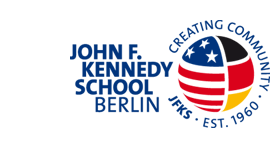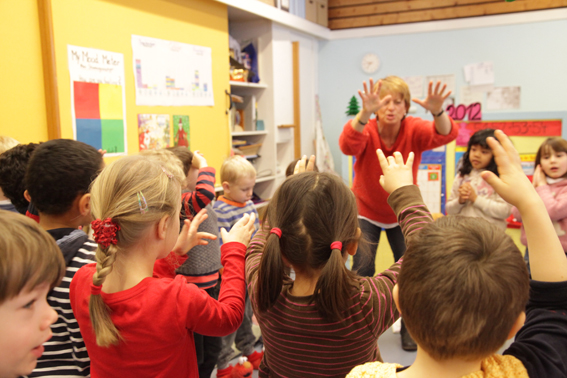Like all JFKS educational programs, the entrance class is designed to enhance learning and social development in a bilingual and bi-cultural environment.
By assisting each child’s integration into the school community and teaching appropriate social behavior in building respect for the rights and feelings of others, the entrance class serves as developmental bridge between the family and the broader world. Children learn to listen and wait their turn and gain confidence by expressing their ideas in front of their classmates.
Classroom celebrations such as Halloween, St. Martin’s Day (Lantern Festival), Thanksgiving, St. Nikolaus Day, and Fasching (Carnival) acquaint the students with the customs and traditions of the partner nations. Other celebrations throughout the school year help students become aware of different cultures and belief systems.
Singing in both languages as well as arts and crafts projects play an important role in the Entrance Class, supporting the children’s language and fine motor skills development. The Entrance Class students have one hour of physical education taught at the JFKS gym.
The entrance class offers a preschool curriculum, which is designed to prepare the children for learning in school, writing and early math. Pre-literary mother tongue lessons in German and English are introduced to the children in the second half of the school year as is a special early math program, “Math Their Way”.
At JFKS there are no single-language classes; in every homeroom German and English speaking children learn and play together. Instruction in the classrooms is held in both languages at once.
Most JFKS students are admitted into the entrance class which starts one year before first grade.
The JFKS Music Department offers a Suzuki violin program for children in entrance class, for more information please check in the Fine Arts section under The Suzuki Violin Program.
The school day for the entrance class starts at 8:55 and lasts until 13:20.
A typical school day is composed of different elements, more or less in the same order every day.
- Meeting/Pick up: The children are picked up by their teachers every morning at 8:45 in front of the school. Each class then enters the building together.
-
Circle Time – each day begins with a morning circle. We sing songs in both languages, we report and discuss and learn about particular themes tied to the seasons and the school year.
-
Calendar – the calendar is used for cultural learning, as well as a basis for beginning mathematical and numerical learning.
-
Project – every day, we complete a small project, mostly to train fine motor skills. We learn how to use different materials and practice painting, drawing, gluing, ripping, cutting, stamping, and beginning writing skills.
-
Snack – a long day full of hard work and paying attention makes children hungry! We stop for a snack break around 10:30 or 11:00 when children may eat the snacks they have brought from home. Please do not confuse this with the healthy breakfast which children must eat at home before coming to school! You will receive more details about what we expect for a snack once school begins. Please note that sweets will be sent home again and are not allowed!
-
Playtime – after snack, children have free play time, during which they are encouraged to get to know each other better, make new friends, and take advantage of the myriad games and toys in the classroom. During this time, we emphasize cooperative play, train social competencies, and encourage compromise and conflict resolution.
-
Read aloud – there is always at least one story each day, which corresponds to current themes. It is read in either English or German, roughly translated, and discussed as a group.
-
Outside play – at the end of the school day, the classes meet outside to play in the Entrance Class yard. Having a common outdoor playtime encourages friendship and cooperation across classes.
-
After school – the children are picked up by their Hort or Late Birds Erzieher. Pick up children are brought to the front and meet their parents by the front gate.
–
This post is also available in: Deutsch




